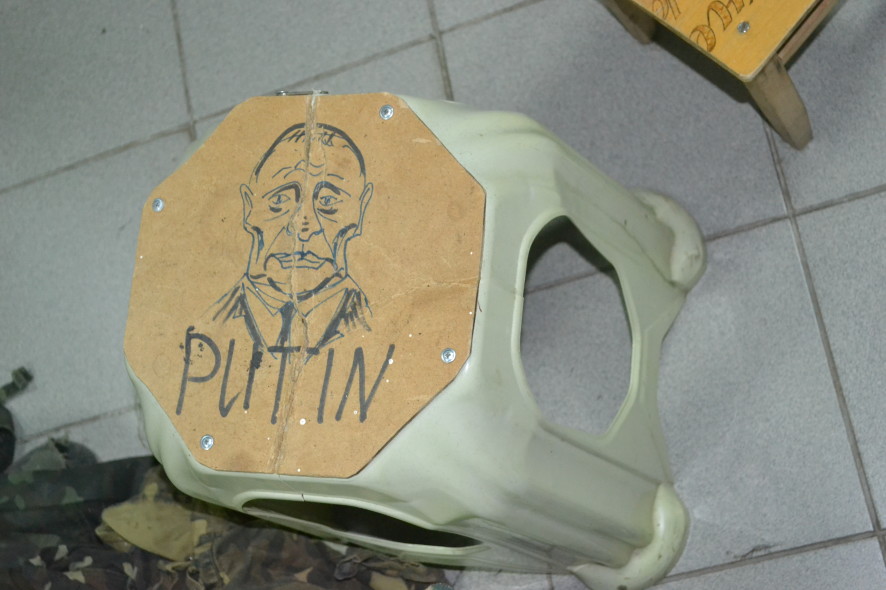by Filip Rambousek, Kramatorsk.
Getting up early this morning, I caught a 6 AM train from Kyiv to Slavyansk, a city in the east of Ukraine, which has grown by more than 30.000 internally displaced persons (that is, refugees from the areas directly stricken by war) from its originally size of some 90.000. Aside from the fact that it has a direct train connection to Kyiv though, and is used by most local international NGOs for their headquarters, it is only remarkable for how run down and unremarkable it is.
 After a quick meeting with international NGO workers, we were glad to catch a marshrutka (minibuses that serve as the backbone of public transport in much of Ukraine) and travel some 20 minutes south, to Kramatorsk. Both Slavyansk and Kramatorsk were actually at one point under rebel control, but the rebels withdrew in the July of 2014. The 5th of July is now officially celebrated as the Kramatorsk independence day.
After a quick meeting with international NGO workers, we were glad to catch a marshrutka (minibuses that serve as the backbone of public transport in much of Ukraine) and travel some 20 minutes south, to Kramatorsk. Both Slavyansk and Kramatorsk were actually at one point under rebel control, but the rebels withdrew in the July of 2014. The 5th of July is now officially celebrated as the Kramatorsk independence day.
Kramatorsk is virtually the press HQ for the conflict, as well as the provisional seat of the Donetsk Oblast, and it is a larger, and overall much more interesting city than Slavyansk. Our guide was a local activist and Kramatorsk native, who has been shelled, seen the front line engulf him, and experienced life in rebel controlled territory. We spent the day exploring the city, talking about the war, and meeting all sorts of volunteers and representatives of civil society.
Being Czech myself, I was shocked to find a Czech cultural centre at the local library. The centre organises language classes and supports students who want to study in the Czech Republic. De jure, the aim is that these young people will return and help reform Ukraine. De facto, the director knows full well they simply want to get out of here. I have not seen this much enthusiasm for the EU in a long time. Do they see in the EU something that many of us do not, or do they not see the many drawbacks that the member states have to put up with?
Then again, anything is better than living at the edge of war.
Next, we toured  a local volunteer workshop, which focuses on producing camouflage nets and ghillie suits for the Ukrainian soldiers and materiel. This has so far been the highlight of my trip. The volunteers- mostly women from 50 up- were so glad to see that they had not been completely forgotten by the world, their welcome could not have been warmer. We sang the Ukrainian anthem, fought off demands that we immediately eat soup because it was absolutely clear that we were starving, and promised we would be back to celebrate the Kramatorsk liberation day.
a local volunteer workshop, which focuses on producing camouflage nets and ghillie suits for the Ukrainian soldiers and materiel. This has so far been the highlight of my trip. The volunteers- mostly women from 50 up- were so glad to see that they had not been completely forgotten by the world, their welcome could not have been warmer. We sang the Ukrainian anthem, fought off demands that we immediately eat soup because it was absolutely clear that we were starving, and promised we would be back to celebrate the Kramatorsk liberation day.
As everywhere in this city, we heard war stories.
We were told the ways many of the local boys, ranging from 16 to 18, died fighting, and the ways the volunteers themselves ended up in Kramatorsk, as many of them have had to leave Donetsk and the surrounding areas. In the en d, one of the few male volunteers told me his brother had been killed while taking part in the Soviet invasion of Czechoslovakia in 1968. The brother’s death was his family’s tragedy, he said, but his nation’s shame.
d, one of the few male volunteers told me his brother had been killed while taking part in the Soviet invasion of Czechoslovakia in 1968. The brother’s death was his family’s tragedy, he said, but his nation’s shame.
We agreed that our countries’ experiences were much too similar.
In the evening, we met with the head of the local veteran’s association, who talked us through the organisation’s brief history and work. He described the difficulties they have with persuading the vets to talk to a psychologist, as well as the many different types of extreme sports events which they provide for the vets just to fill their need to feed their adrenaline addiction, which so often arises after experiencing combat. Overall, this interview was the most difficult; the man, a veteran himself, admitted he disliked talking to journalists, because they always ask about what he did in the war. We resisted these questions, but sensed he was glad when he left.
Finally, I have already begun to reach my goal of experiencing the practicalities of a (quasi) military life. In short, I learnt that moving around in a warzone in a military outfit, with heavy boots and a heavier backpack, on a scorching hot day, is exhausting and demotivating. The only thing that could make this even more stressful would probably be to be shot and have to shoot back.
Tomorrow, when we leave Kramatorsk and move on, we might get to experience just that.




